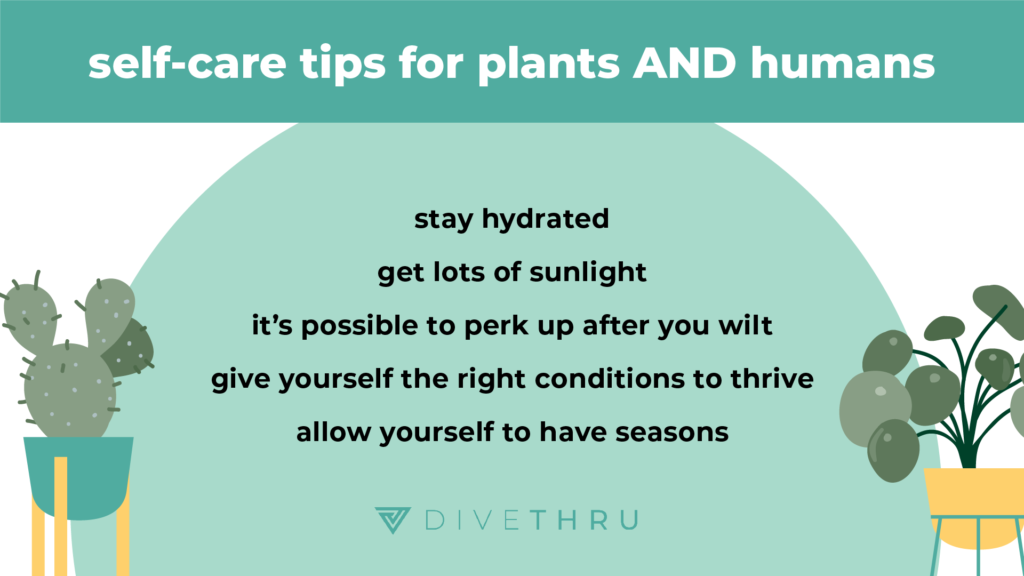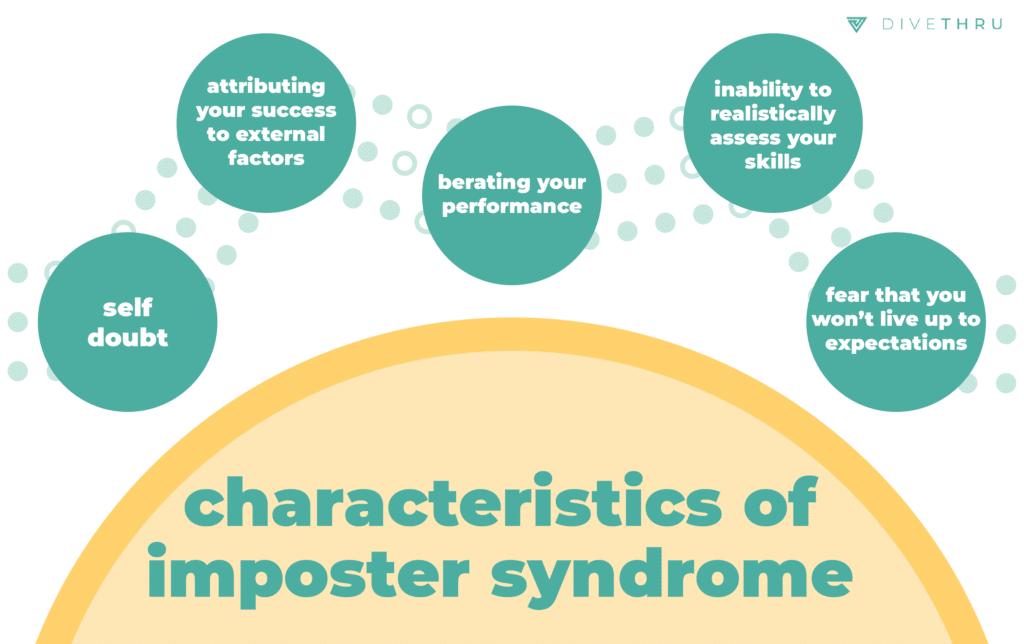At DiveThru, we’re alllll about self-care. We’re also all about honesty. And let’s be honest, most of us can’t afford a weekend getaway to the mountains, complete with massages and facials, pedicures and personal chefs. So, we’re always on the hunt for new (and free) self-care ideas for stress. Because if we’re still being honest, we’re all stressed. All the time. All of us.
Andddd, our search lead us to discovering many different ways to practice self-care that don’t cost a dime! Since sharing is caring, we’ve compiled a list of our favourite free self-care ideas.
Here are 9 easy peasy ways to practice self-care every dang day. These suggestions come from every category of self-care: physical, mental, emotional, social, and spiritual.
1. Go to the Park with (or Without) Your Friends
This one almost has too many benefits to list. Almost.
For starters, to get to the park, you’ll probably have to walk at least a little bit. That’s physical self-care. Next, you’ll be outside, surrounded by beautiful green things, which is definitely good for your mental health. If you meet up with a friend, you’ll also be getting a nice dose of social self-care by interacting with other humans in person.
And lucky for you, hanging out at the park with your friends is Covid-19 friendly, too. Bring your mask, your own snacks, and a blanket to sit on. Just like that, you’re set for a socially-distanced date.
2. Journal
Journaling is the ultimate form of self-care. Easy, attainable, and free, it incorporates almost every category of self-care. If you don’t believe us, you’ve probably never had a cramp in your hand from writing too much too fast. That counts as a workout, right?
Jokes aside, journaling is one of the best ways to practice self-care out there. It allows you to organize your thoughts and gives you a confidential, judgement-free space to express what you’re going through. Listening to how you’re feeling is crucial to taking good care of yourself.
But what if you don’t even know how you’re feeling? What if your thoughts are just a jumbled mess up there? You can probably guess where we’re going with this. Psst… JOURNAL IT OUT.
If you’re looking for a way to start journaling, our DiveThru app has hundreds of free journaling exercises on a wide range of super relevant, everyday topics.
Stressed about work or school? We got you.
Feeling anxious about the Covid-19 pandemic? We got you.
Need help getting over a breakup? We got you.
Whatever you’re going through, we got you. Download the DiveThru app (it’s free!) and get started today. Then when you’re playing around in the app, make sure to try out the feeling-tracking tool!
3. Stretch
Ok. Hear us out. Stretching is soooo underrated. It’s the perfect way to pause and check in on yourself before, during, or after a busy day. Stretching allows you to release some of the tension you’ve been holding in and gives you a chance to slow down, even if it’s just for a few minutes. And that’s something we could all use a little bit more of.
We highly recommend incorporating stretching into your daily routine. It doesn’t have to be anything fancy; it can be a quick morning wake-up stretch or time set aside to release tension and calm nerves before you go to bed. Take 5 minutes to try it out and get ready to see this mental, physical, and emotional self-care practice in action.
4. Read
After you’ve had a tough day, sometimes all you want to do is escape for a while. Reading is the perfect escape because it allows you to go anywhere without leaving the comfort of your couch.
Maybe you’re being whisked away to a magical world, maybe you’re trying to wrap your head around a complex mystery, or maybe you’re learning new and amazing things. No matter what genre of book you’re reading though, you’re practicing some serious self-care. So, grab your book, get cozy, and get lost.
5. Take Care of Your Plants
We are firm believers in the benefits of plants. In case you missed it, we have an entire blog post dedicated to the emotional, physical, and mental health benefits of plants. Here’s what you need to know: plants improve air quality, productivity, and healing. Research shows that they reduce stress when compared to computer-focused tasks, too. So, by caring for your plants, you’re also caring for yourself.
6. Draw and Maintain Boundaries
No, we are not talking about the kind you use to establish your foothold in Catan.
Actually, wait, we sort of are! Just as you use boundaries to establish your territory in Catan, you use boundaries to tune into your own needs in real life.
When we establish healthy boundaries and learn to communicate them, it builds our self worth as well as reciprocity in healthy relationships. If we can ask for what we need, we are honouring ourselves rather than putting the needs of others first. This way we also avoid depleting ourselves in the process of pleasing others first.
So, whether it’s accompanied by a face mask or not, take a beat to think through your boundaries. Make note of the ones you’re actively maintaining and those that have become muddled over time.
7. Practice Self-Compassion
Why does this need to be said? Well because the way we react to our own everyday struggles is harsher than the way we react to our friends having the same struggles.
Here’s what we mean by that. We’re awful and mean to ourselves when we stumble and fall down. We tell ourselves we’ve failed, and that we shouldn’t even be trying because let’s face it we’re not good enough anyways. Sounds harsh, doesn’t it?
But it’s also accurate, isn’t it? Would you ever catch yourself speaking that way to your best friend?
Self-compassion stops that train in its tracks. Being as kind to yourself as you would be to your best friend is how you break that pattern. Learn to build a curious and gentle inner voice. We promise you this will change how you perceive yourself and those around you for the better.
And if you’re not sure about how you treat yourself right now, take Dr. Kristin Neff’s test to measure your self-compassion.
8. Challenge Negative Self Talk
We know what it’s like to live with this insatiable inner critic that your brain has created to constantly bash your efforts. Please don’t listen to that sh*tty voice. The world is mean enough as it is and this inner critic makes it much harder to navigate it.
Challenge self deprecating thoughts with a more neutral response (or positive if you can). Recognize that you have to be patient with yourself because it takes a lot of time to learn a new task, start a new habit or understand present barriers.
Work to unpack the feelings that are behind the negative self talk. This way, you can understand the roots of your feelings of unworthiness, rather than believing and accepting it as truth. Look to people who have a healthy relationship with themselves and seek answers as to how they built their sense of self.
9. Create Affirmations
Here’s the thing about affirmations – they work best when they actually resonate with you. Which is why we want you to write your own! No more endless scrolling through Pinterest quotes to find the right one.
To create a self affirmation, connect with the insecurity you are experiencing. Then, think of what you might say to a loved one if they had the same insecurity. Write that thought down.
It doesn’t need to be “perfect” and it probably won’t feel “comfortable” but trust us on this.
Another option is to read lyrics or poetry (check out Morgan Harper Nichols for her amazing art + words) and pull out quotes that resonate with you.
There’s one more thing you can do! Keep note of positive statements others share with you, about you. Turn those into affirmations! It may be more comfortable than creating your own because you know with certainty someone else believes those things about you.
How to Turn Your Self-Care Ideas into Practice
Now that you have some fresh (and free!) self-care ideas, it’s time to look at ways we can make the new practice stick. These are the strategies behind self-care, if you will.
They have been shared by psychologists and mental health professionals alike and will help you design a self-care practice that meets your needs. These 5 strategies will make sure you’re getting the most out of your self-care, because you deserve it.
1. Schedule It
You know the expression, “I can’t tell you how important _____ is”? Well, unlike whoever said that, we can tell you how important this is. And we will.
It’s SUPER DUPER important to schedule time for self-care.
We’re all so busy that chances are, if it’s not in the planner, it’s not gonna happen. Do yourself a favour and put self-care in your planner. Try to let go of the notion that self-care comes last. Self-care should be prioritized just as much as anything else in your life. The better you care for yourself, the better you can care for others.
Thank you for coming to our TED talk.
2. Multitask (If Needed)
If you’re looking at that schedule and thinking, “there’s just no way I can fit in self-care today”, look a little closer. What about during your commute? If you take the bus, instead of scrolling social media, what if you took those minutes to practice breathing deeply? If you drive, what about having a one-person karaoke dance party in your car (safely, of course)?
These are all different types of self-care that don’t eat up a huge chunk of your schedule. By multitasking, you may be able to fit in more self-care than you thought.
3. Ask for Help
Although self-care is about yourself, it doesn’t mean that others can’t help. Here’s what we mean. It might be something as simple as asking for 10 minutes of alone time, or asking your partner to hold you accountable for your weekly bike ride.
As psychologist Ryan Howes, Ph.D. explains, asking for help can also save you time and energy in the long run, which contributes to a healthier you. He used an example from his personal life of asking for help with PowerPoint. By simply asking people he knew, he not only saved time, but gained some useful experience for the future, too.
4. Care for Every Aspect of Yourself
Despite what social media might tell you, self-care is not just putting on a face mask. It can be part of it, sure. But to properly care for yourself you have to care for your whole self — that means physically, mentally, emotionally, socially, and spiritually.
Your self-care practices should include a variety of activities because your life includes a variety of activities. Do the face mask. Stretch before bed. Journal through your thoughts. Write your affirmations. Get the sleep your body needs. Get the nutrition your body needs. Feed your soul with its spiritual needs. Understand the emotions you feel.
It’s all part of the big picture we call “wellbeing.”
5. Do What Works for You
As always, it will take some time to figure out the self-care routine that works for you. Don’t think that you have to practice self-care the same way that everyone else does. Because you don’t.
Be willing to put in the time and effort to find out how to care for yourself.
Self-care doesn’t have to be complicated. In fact, it shouldn’t be. These easy strategies and suggestions are here to remind you that the little things go a long way when it comes to taking care of yourself.
And give yourself a big pat on the back because you might have just found your new favourite self-care strategy reading this!












